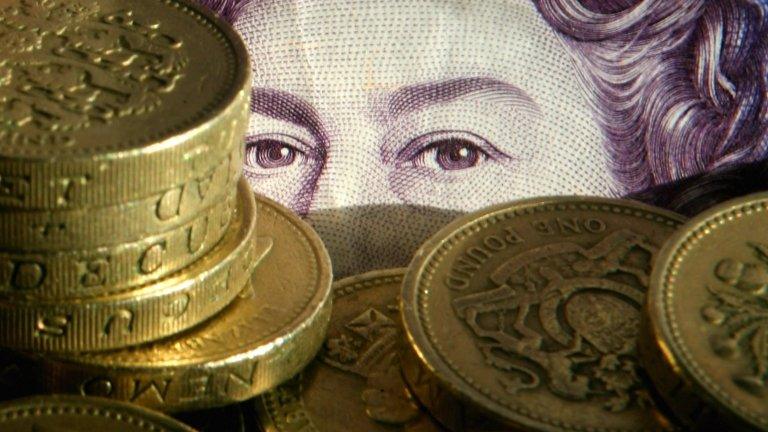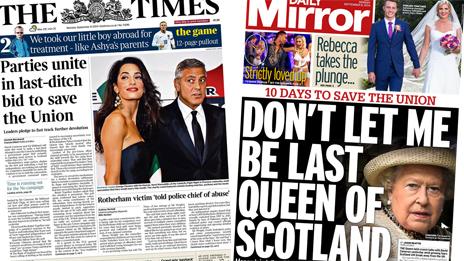Pound falls on fears of Scottish independence
- Published
The pound has fallen to its lowest level in 10 months amid uncertainty about Scotland's future within the UK.
The currency fell 1.3% against the dollar on Monday to $1.611, and also fell 1% against the euro to 1.2488 euros.
The weakening came after a YouGov poll suggested supporters of an independent Scotland had taken a narrow lead in the referendum debate for the first time.
Just a week ago sterling was trading at $1.66 against the US dollar.
Shares in Scottish-based firms suffered sharp falls on the stock market. Edinburgh-based Standard Life closed 2.43% lower on Monday, Royal Bank of Scotland slipped 1.3% and Lloyds Banking Group, which owns Bank of Scotland and Scottish Widows, dropped 2.43%.
Perth-based energy supplier SSE, Glasgow pumps specialist Weir Group and fund manager Aberdeen Asset Management also all fell between 1% and 2.25% over the course of the day.
"The latest poll is a big wake-up call for all the investors who had not yet priced in the risk of a vote in favour of independence," said Alexandre Baradez, chief market analyst at IG France.
Deutsche Bank foreign exchange strategist Oliver Harvey said the market should now price in "at least" a 50% chance of a "yes" vote.
"The implications of a yes vote would be huge. On the currency side, it could at worst lead to a destabilising crisis in the whole British banking system and at best leave the the rest of the UK with an unstable currency union," he wrote in a note to investors.
Mr Harvey also warned that a "yes" vote could "easily derail the UK economic recovery".
"Scotland represents the rest of the UK's second largest trading partner after the EU and many corporate investment plans are likely to be put on hold until clarity over currency, regulatory and tax questions is achieved," he added.
Considerable uncertainty
Voters in Scotland go to the polls on Thursday, 18 September, when they will be asked the "Yes/No" question: "Should Scotland be an independent country?"
The poll, which featured in the Sunday Times, suggested that - of those who had made up their mind - 51% would vote to leave the UK, compared to 49% who would vote not to.
There is considerable uncertainty surrounding what currency arrangements an independent Scotland would make, with politicians in Westminster saying a formal currency union would be impossible.
Scotland could use the pound informally without control over policy in any case - as it could do with any other currency.
Barclays said in a research note that the vote for independence was just "the opening chapter".
"[There will be] uncertainty over issues ranging from the timelines for political and economic independence, resultant institutional frameworks, lender of last resort for Scotland, the division of assets and liabilities, fiscal impact and policies, and what currency choices Scotland will have available and choose," it wrote.
The BBC's economics editor Robert Peston said that "the longer the uncertainties persist, the more prolonged the UK will suffer from an elevated cost of finance, and the greater the harm there will be to economic growth - both sides of the border."
- Published8 September 2014
- Published8 September 2014

- Published7 September 2014
- Published8 September 2014
